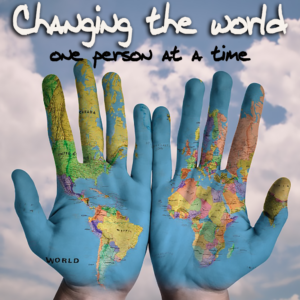Changing The World, One Person At A Time
I don’t know about you, but I’d kind of like a “do-over” on 2020. It’s only halfway through, but it already feels like we’d be better off if we could just scrap it and start again. But life doesn’t work that way. The fear and uncertainty from the Coronavirus, followed by the unrest sparked by the killing of George Floyd, have made life incredibly tense in so many ways. We’ve become so divided that it can seem as if concepts such as brotherly love, unity, justice, peace, and community are beyond us. So how can we as Christians change that and even grow God’s kingdom in the process? The book of James gives us some straightforward, practical instruction.
James 2 tells us, “Believers in our glorious Lord Jesus Christ must not show favoritism” (v.1). We’re to show everyone love and respect, not treating anyone differently because of a particular group identity. In James’ day, the tendency was to discriminate against the poor in favor of the rich. In 2020, we’re divided not only along socioeconomic lines, but racial, sexual, political, geographical, and ethnic lines as well. Heck, we’re not even sure about that guy down the street who likes a different team than we do!
We all have some biases toward those like us and against those who are different. It doesn’t mean we’re all hopeless bigots, but it does mean we have to work to overcome those biases to make certain we’re treating all people like the unique, valued creations of God that they are.
James 1:19 says, “Everyone should be quick to listen, slow to speak and slow to become angry….” This short verse gives us a guide to how we’re to interact with others, especially in times like we’re going through now.
“Everyone.” There are no exceptions. If you’re a follower of Christ, you’re expected to do this. As a kid I loved watching Juan Epstein on Welcome Back Kotter bring in notes from home, requesting that he be excused from whatever it was he didn’t want to do, always signed, “Epstein’s Mother.” There are no notes excusing us from responsibility for what James is about to tell us. If you follow Christ, it applies to you.
“should be quick to listen….” We’ve all been in conversations where we know the other person isn’t really listening; they’re either distracted by something else or just waiting for their turn to talk. And we hate it. But too often we’re guilty of it ourselves. Listening is where we learn—it’s where we learn facts, as well as what makes the other person tick. God wants us to work to where listening becomes our first instinct—what we’re quick to do. We can choose to develop the mindset that we actively listen to what others are saying. Here’s a tip: If you find yourself in a conversation and you forget what you were going to say, you’re making progress.
“slow to speak….” How often do we cause problems in our relationships or general ill will because we’re too quick to speak? Today “speak” would include sending a text or posting tweets and comments online. The things we say can’t be unsaid. And in this digital world, they last forever. James goes on in v.26 and says, “Those who consider themselves religious and yet do not keep a tight rein on their tongues deceive themselves, and their religion is worthless.”
“and slow to become angry.” There’s so much anger and vitriol in our world today. We used to be able to disagree with someone and still remain friends. Now the battle lines are drawn and if someone disagrees, he’s the enemy: Hateful, violent, and evil. Problems are never solved when we’re governed by our emotions—especially anger. Jesus said, “Love your enemies and pray for those who persecute you” (Matthew 5:44). You find yourself a lot less angry with someone if you’re genuinely praying for them.
I heard Andy Stanley say, “Pain without gain is a terrible shame.” Our country is going through some pain right now. It’s our response to it that will determine whether we come out the other side better for it or worse. The choice is up to us. We can’t change the world, but we can change our little corner of it. And if enough of those little corners get changed, the next thing you know, the world is different too.

